Part 9
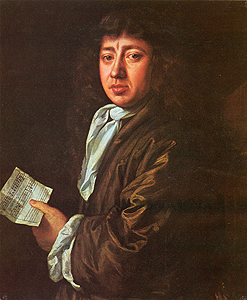
Yama Zhiko was born in Barcelona on All Saint's Day in 542 AD. His mother, wife of the Russian diplomat to the Spanish crown, woke to the peal of church bells and spontaneously entered labor. Records of the Christian Church indicate that Sister Vargas was midwife to the birth, but any further involvement of the Christians is unsupported by the evidence.
Nevertheless, Yama Zhiko was widely known during his life as the Baptised Bureaucrat. The story goes that he was brought into the church by a nun, presumably Vargas, who was concerned for the salvation of his newborn soul. Unaware of the child's foreign birth and Hindu heritage, a deacon baptised him under the light of the magnificent Gloria Mundis stained glass windows.
It is likely that this story is a fabrication. At the age of sixteen, Yama Zhiko returned from the city of Barcelona to study under the Taoist priest, Obeshchan of Grozny, in the Great Library at Moscow. As a gift to Tsar Peter, he hired an entourage of Gregorian monks to chant in the Great Library's main hall. Despite the hall's sub-optimal acoustics, Peter was deeply impressed with their performance and offered Zhiko a massive commission to produce a book concerning the art and culture of the little known Christian faith. Hence, the epithet "Baptised Bureaucrat" is likely a pejorative reference to his prolonged interest in Christianity.
Yama Zhiko was not a Christian, however. Born to a Hindu family in a Buddhist nation and in a Christian city, Zhiko's sense of religious piety was confused at best and absent at worst. In his journal, he often wrestled with atheism and doubts about the existence of the supernatural. However, his meeting with Obeshchan changed all that. Taoism embraced both of the opposing elements of secularism and mysticism that plagued Zhiko. He found comfort in contemplating the duality of the Tao, and he relished the freedom of its religious and philisophical principles. By the time Obeshchan retired to Grozny to found the first Taoist pagoda, Zhiko had become a kind of Taoist missionary in Moscow.
Zhiko's primary contribution to the Russian empire was neither religious, nor cultural, however. His only work, On Christian Practices, was divided into five parts. The first two parts discussed Christian music and iconography, respectively, but it was the latter three parts that changed Russia forever. Section three explained how to keep records like the Christians; section four contained a detailed plan for implementing a bureaucracy; and section five detailed exactly how that bureaucracy could apply Christian record-keeping practices to solve many of Russia's biggest organizational flaws.
After reading Zhiko's book, Tsar Peter called his generals to his court, and began to draw up plans to overthrow the various governorships throughout the empire. In their place, he planned to install a loyal civil service.
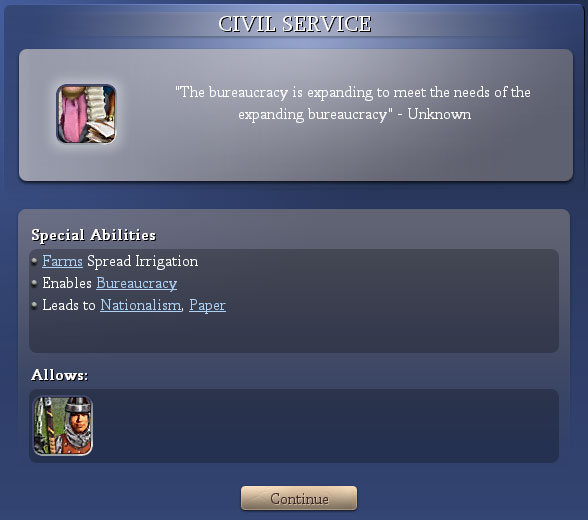
Aside posted:
Civil Service finished in 560 AD.
This technology is absolutely fantastic. It not only allows me to select swap to the Bureaucracy civic, but it also allows me to build Macemen (like Axemen, but strength 8), and it allows me to irrigate farms.
Irrigation is simple. When you build a farm next to a freshwater source (river, lake, or inland sea), that farm is irrigated, and for the purposes of building new farms, that farm tile counts as a fresh water source. Since you can only build farms if they are near fresh water, Civil Service allows you to build many more farms than before. Furthermore, cities spread irrigation--meaning that a city can also becomes a fresh water source for the purposes of farm building.
At this point, you can chain farms together to spread fresh water irrigation to the drier cities on your continent.
One more detail: if a farm is not irrigated (say, a farm in the chain is destroyed for whatever reason), then it produces one less food. This makes unirrigated pre-Biology farms as useful as no farm at all.
As for Bureaucracy... well, it's time to explain civics. So let's select some!

Click on this sucker.
After twenty years of anarchy, Peter's bureaucratic grip on the Russian empire was complete. From Moscow to Bombay, a single unified government began to handle the day to day legal affairs of the state, and through these faceless entities, both public works and public taxation became regular affairs in the empire. As a result, irrigation canals were dug as far as dry Crimea, and the coffers of the crown filled with gold.Aside posted:
The game contains 25 civics. The default five on the list: Despotism, Barbarism, Tribalism, Decentralization, and Paganism, have no game effects, and have low upkeep costs. This means that for every city you own, you have to pay a smidge of gold out of your account to run the civic. More on maintenance later in this update.
The other twenty civics cost various amounts of upkeep in exchange for various benefits. As you can see, I've currently got Slavery and Hereditary Rule selected. Since they cost the exact same upkeep as Despotism and Tribalism, there was little reason not to switch to them as they became available.
Slavery allows me to kill population in order to hurry production, and Hereditary Rule makes my cities happier when I garrison military units in them.
Notice that some of the civics have icons next to them, and others do not. Those without icons have not been unlocked. I have to research the correct prerequisite technology (or in the case of government civics, I could build the Pyramids) before I can use a civic.
Caste System was unlocked by acquiring Code of Laws. I haven't switched to it because I plan on using Slavery a handful of times before I swap away. Organized Religion was unlocked by Monotheism, and Pacifism was unlocked by Philosophy.
Civil Service unlocks the legal civic of Bureaucracy. Let's see what it does.
Click on me!
If you'll notice, my upkeep from civics will change from 25 to 31. This is because Bureaucracy is medium upkeep and Organized Religion is high upkeep. It will be worth it, however, because these civics will aid my growth immensely.
Bureaucracy increases the production and commerce of the capital by 50%. This will increase my research and money production immensely, since in the early stages of the game, the capital is providing the vast majority of your research and commerce.
Organized Religion speeds the construction of buildings in cities with my state religion by 25%, and it allows me to build missionaries without building monasteries first.
I want to build monasteries, by the way. They give a 10% research bonus until you research the Scientific Method. But Organized Religion will allow me to spread my missionaries much faster.
On the bottom of the screen, it says the game will take one turn of anarchy to switch. During anarchy, all cities put production on hold and research stops. However, workers will still work in the fields, and military units may still fight. So next turn, after the switch, all the effects of these two civics should come online.
But that wasn't enough for Peter. He knew that public works wouldn't compensate the people for the increased taxes. In a bid to head off discontent and to unify the Hindu-Russians with the conquered Indians, the Tsar instituted a policy of Organized Religion. The state officially converted to Hinduism, and throughout Russia, the religion of the Brahman was spread.
In 600 AD, the great artist Homer of Egypt came to Khoisan, a former barbarian village, and painted In the Gardens of the Sky, a mural which brought great Egyptian interest to that little known corner of the Egyptian empire. The swarm of noble tourists and their entourages eventually influenced many craftsmen to settle in the area, driving back the unwritten boundary of the Russo-Egyptian border to the walls of Port Kavkaz.Aside posted:
I will switch to Taoism in a while, but for now I need to produce culture and infrastructure in all the conquered Indian cities, and the best way to do that is combine Organized Religion with a religion that is already there.
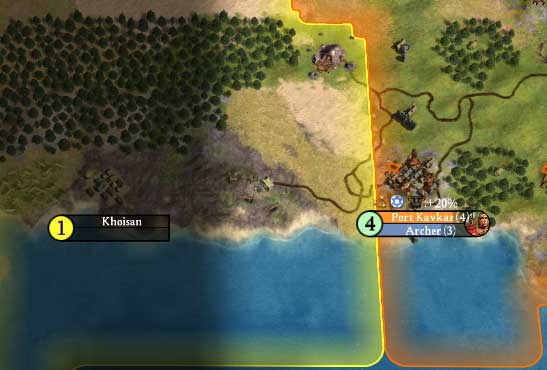
In his last years, Yama Zhiko left for St. Petersburg. There, he founded the second Taoist pagoda of the Russian empire. One night, he woke up and summoned his students to his bedroom, where he told them that he could hear bells. They insisted that their master was dreaming, but Zhiko became angry at this and demanded that they take him to his chair on the face of the pagoda so that they could also listen to the bells. His students complied, and together they sat in silence and stared out at the hills around St. Petersburg. Finally, when dawn came, the eldest student arose and asked Zhiko if he could retire for the morning. But Zhiko could not respond. In his wrinkled hand he held the symbol of the Taijitu, and through his unblinking eyes he eternally contemplated the Tao in the company of the sun, under a heaven filled with pealing bells.Aside posted:
Oh holy christ, I fucking hate you Hatshepsut. She dropped her fucking first great person in a dinky little barbarian city she captured along the coast. Since it was a great artist, it generated 4000 culture with its great work, and then exploded out of control.
I guess now is a good time to discuss culture. Religions, specialists, and buildings produce culture points. These culture points accumulate until the city reaches a certain level, after which its cultural influence is so high that it's borders expand to cover more terrain. Since you can only work tiles and build improvements within your cultural borders, it is crucial that you produce slightly more culture than your opponents, so that over time, you slowly devour their land and make it your own.
If a city is enveloped by an enemy culture, the citizens of that culture begin to infiltrate it. Once it reaches a critical majority of foreigners, that city gains a chance to revolt every turn; the first time it revolts, it simply refuses to work for your civilization. The second time it revolts, there is a strong chance that it will peacefully secede from your civilization and join the empire of its majority nationality.
Egypt used a great artist in Khoisan to produce 4000 culture points in one turn. This caused it to reach level 3 culture (influential), which made its borders expand 3 times. Furthermore, since Port Kavkaz only has a handful of culture points (something like 90), its borders were overwhelmed easily.
After the archer completes in Port Kavkaz, I've got to spread culture producing buildings and religions to the city, or I'll eventually lose it to the Egyptians.
Fucking Egyptian bitch, I'll kill you someday... >:|
The years following the death of Zhiko:
640 AD
In St. Petersburg, the bureaucracy finished construction of the aqueducts. Fresh water was brought in from the hills to supplement the increasingly dirty water in the river. In the same year, construction began on a magnificent tiered garden which would use the warm aqueduct water to grow flowers and plants imported from the Yangtse Junlges in the north.
680 ADAside posted:
Aqueducts increase the health of a city by +2. As St. Petersburg grows, this extra health should partially make up for the forges (and later factories) that I will build in the city.
This also allows me to build The Hanging Gardens. At this point, someone is probably already three-quarters done with this world wonder, but if I fail to earn it, I'll at least nab some free gold.
While exceedingly drunk, Pharoah Hatshepsut of Egypt recompensated Russia's loss near Port Kavkaz to the tune of 280 pounds of pure gold.
Aside posted:
Since Egypt's favorite civic is Hereditary Rule, and I'm using Hereditary Rule, I get a +3 bonus to diplomacy with Hatshepsut. Combine this with my open borders bonus and my small religion penalty, and it turns out that Hatshepsut is pleased with me. So, I figured since I've got a humongous military, why not ask her for all her gold? Because we're friends, it won't count as an arrogant demand if she decides not to comply.
And then, for no good reason, she gives me all 280 of her gold. It's time to turn up the research rate, run a deficit, and speed towards Guilds.
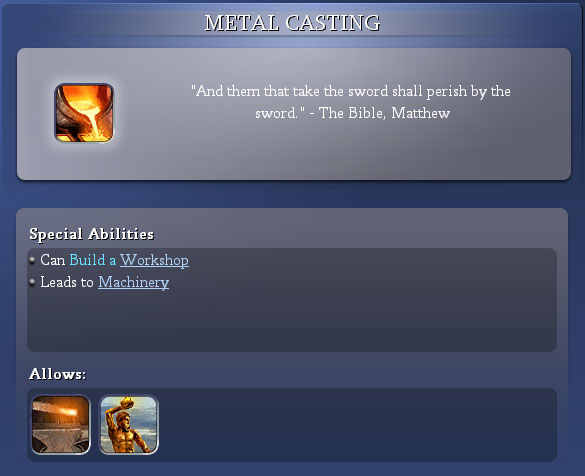
700 AD
Though techniques for sword production improved throughout the Russo-Indian War, it wasn't until almost 300 years later that the science of metal casting was thoroughly understood by scholars of the Great Library at Moscow. Shortly afterwards, a design of Euclid was revised by Oberon into the ancient forges which even today are scattered throughout the empire. Now swords could be produced by the thousands at half the labor and a fraction of the time.
In 720 AD, by order of the Tsar, the Russians began to construct many courthouses.Aside posted:
Metal Casting gives you the excellent Forge improvement, which gives a city +25% hammer production at the cost of 1 point of unhealth.
It also allows you to build the Colossus world wonder, which gives all your sea tiles an extra gold. It's definitely a commerce powerhouse for the early game. Too bad I have no good production cities on the sea. Maybe Bangalore on the Ice Finger will work, once its borders expand onto the fish tile.
The Tale of Tarkhan's CampaignAside posted:
It's time to talk maintenance.
Each city, unit, and civic costs money to run. The more of them you have, the more money you need to pay for them.
Cities have two costs associated with them. The first is the base city maintenance cost, which is determined by the number of cities in your empire. The more cities you have, the more difficult it is for your government to run them all. Hence, each one costs even more as you empire expands. Ouch. The other cost is the distance to palace cost. This represents the difficulty in running a city on the far side of the planet. Hence, the further a city is from the center of government, the more it costs to run.
Units have two types of costs. Support, and supply. Support costs are a base 1 gold cost for letting the unit exist. Supply costs are the costs you pay for having a unit in enemy territory during a war. These are generally 1 gold, but they can increase with distance and time.
Civics have costs depending on their upkeep. The calculation for this is a bit weird, so just use the little helper on the bottom of the civics screen to figure out if you're willing to pay that much for civics on every turn.
How do you earn gold?
Certain buildings like holy cities produce gold for each city on the planet with a certain religion. Other buildings multiply the gold output of your cities with a modifier. For example, a market or a grocer gives +25% gold in the city, while a bank gives +50% gold. Merchant specialists can also be assigned, and they earn 3 gold for a city each turn (plus they produce 3 great merchant points). You can also trade technologies and resources for gold; you can pillage improvements in war for gold; or you can capture a city and earn money from the automatic pillaging of buildings.
But most importantly, gold comes from commerce. Commerce is generated by tiles, by trade routes, and by civics that increase commerce. Commerce is *not* gold. It is potentially gold, culture, or beakers for research. There is a button on the top left of the screen that allows you to adjust how commerce is distributed.
You can produce more culture by spending part of each turn's commerce on culture. You can produce more research by spending part of each turn's commerce on research. Any commerce left unassigned is turned into gold.
Right now, 60% of my commerce is going to research, 0% is going to culture, and the remaining 40% is going to gold. Even so, all the units, cities, and civics are costing me a net loss of 23 gold each turn. Hence, I've got to find ways to earn more cash.
I can reduce research, of course, but that would slow my technological advancement. It's better to build cottages (improvements that increase commerce), use merchant specialists, and use buildings like markets that improve the output of gold.
It's also good to reduce maintenance costs. In this case, I'm going to delete all my very old units (warriors and scouts), and I'm going to build courthouses.
Courthouses reduce the maintenance of a city by 50%. It's one of the most important improvements in the game. Hence, I'm building them all over India while I tech towards knights and my eventual war with China.
Since my Hindu holy city has the Kashi Vishwanath, I'm also spreading Hinduism wherever I can. This not only allows me to spy on enemy cities, but it also gives me another gold for each city with Hinduism.
In the seventh age of Troyan, Vseslav cast lots for the damsel he wooed. By subterfuge, propping himself upon mounted troops, he vaulted toward the city of Kiev and touched with the staff of his lance the Kievan golden throne. Like a fierce beast he leapt away from them at midnight, out of the white town, having enveloped himself in a blue mist.
The author of The Tale of Tarkhan's Campaign is unknown. However, it was this work of brilliant fantasy literature that captured the hearts and minds of the Russian literate and eventually inspired the Russod Movement, a psuedo-Taoist literary enlightenment in Moscow. Custodians of the Great Library at Moscow quickly collected similar works from across the empire, and in a short time, Taoist philosophy and worship flourished in the capital. It was the beginning of an inspirational time for scholars in the Russian empire.Aside posted:
This is actually a passage from The Tale of Igor's Campaign, a Russian national epic written by an East Slav master in the 12th century AD.
The Academy of PtolemyAside posted:
Remember great person points? With 4 scientist specialists and the Great Library in Moscow, I currently earn almost 28 great person points a turn. However, the national epic makes it even better.
This is a national wonder. You can only build one per a civilization, and you can only build two national wonders in a given city. This national wonder gives +100% great person points in the city in which it was constructed.
Now Moscow earns 45 Great Person Points per a turn, 39 of which are for Great Scientists, and 6 of which are for Great Artists (the National Epic naturally produces 2 great artist points per turn). I should produce many, many great scientists now.

A child of St. Petersburg, Ptolemy spent hundreds of hours beside the aqueducts and in the hills testing his designs for powered mills. His lifelong work, Wind and Water, was intended as a guide for the design of windmills and watermills for increasing the production of grain, but it wouldn't be long before inspired students realized that the parts of his inventions were more important than the inventions themselves. His techniques for casting tools and milling finely-crafted parts lead to the proliferation of machinery, and the invention of such common items as the screw, the nut, the bolt, the pipe, and the bottle cap.
His primary student, an Indian named Ravir, founded Ptolemy's Academy in Delhi in order to further the study of machinery and engineering.
Aside posted:
Yay, I settled my second great scientist in Delhi to increase its beaker production by 50%. I'm building farms and cottages all around the city, and I hope that as it grows, it'll produce a ton of commerce.
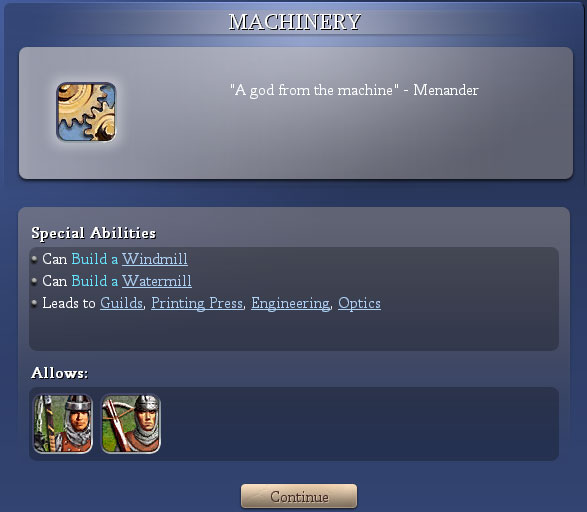
The Bloody YearAside posted:
Machinery allows me to produce Macemen in combination with Civil Service; and I can produce the macemen counter, crossbows. Since I'm going to war against China, macemen will be useless (China uses Cho-Ko-Nu as a unique unit. Imagine a crossbow that did collateral damage.)
Yay! I can also build windmills (food and commerce producers for hills) and watermills (commerce and production for riverbank tiles). Most novices don't use these, but they're eventually crucial for proper city specialization! You'll see.
In 867 AD, the governor of Port Kavkaz finally succumbed to a syphillis infection and went insane. Paranoid that the local Egyptian population was planning to take over the government and secede to the Egyptian empire, he rounded up all the foreigners in the city and enslaved them in what is now known as the Bloody Year. Ironically, though the slave camps were an atrocity, they were responsible for the rapid construction of one of Russia's most popular ancient landmarks, the Proso Library. Even today, the original dedication to Proso is still chiseled into the side of the building, complete with a typo, a final testament to the madness brought on by a disease.
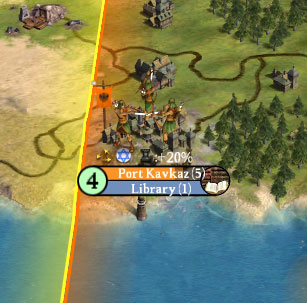
A third of the population died, but the library was completed in seven months. Eventually, it's cultural influence would draw in Russian nationals and push away the Egyptians.
The Gradual Rise of Feudalism
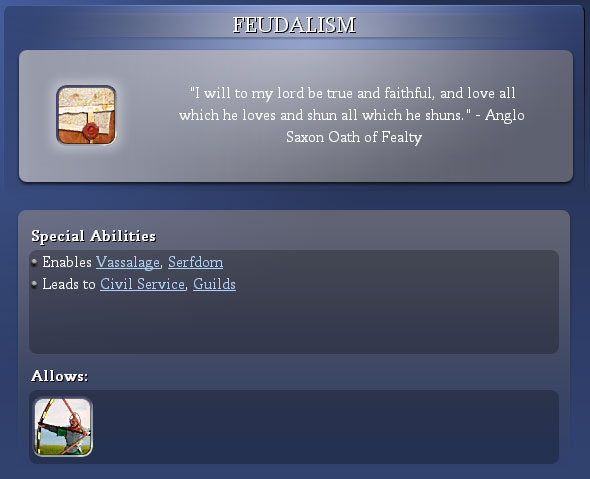
In 920 AD, the courts first acknowledged the Oaths of Fealty, and Feudalism, though the unofficial social order for hundreds of years before, became a state-recognized practice. Leaning on the powers granted by feudalism, lords and knights began to equip their own private militias without the explicit consent of the Tsar.
The longbow--requiring decades of training and conditioning, and once abhorred for its difficulty--now became the defensive weapon of choice. This marked the rise of the professional soldier class in the feudal era.
The Hanging Gardens of St. Petersburg
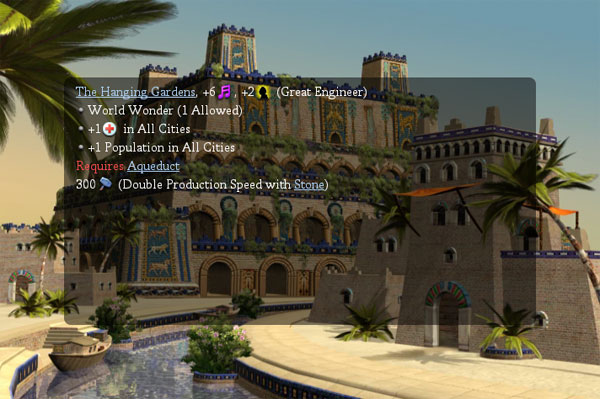
Three years later, The Hanging Gardens of St. Petersburg were completed. This masterwork of engineering still stands today as one of the world's marvels. With no local source of fine granite stone, the Russian people nevertheless managed to collect over 900 tons of the material, all of which went into this tremendous, aqueduct-fed terrace. Even today, the germ-lines of some of the earliest flowering plants are kept alive in the water gardens.
So far...Aside posted:
Longbows, hooray! These are badass defenders. They're exactly like archers, but they have 6 base strength. This makes them TOUGH COOKIES.
I also finished the Hanging Gardens, which makes me smile and pisses me off. I'm happy because I just got a free population in every city. I'm pissed because I wanted the money from failing to complete it. I could have used the 500 or so gold for research.
Ah well, this is better in the long run. But it does make my plans a bit weird. Guilds will take nine more turns to complete, rather than four. Such is life!
It's 920 AD, and I've got a few more turns to go before I have Guilds. At the end of the next update, I should be ready to go to war with China!

Right now I've set two merchant specialists in my capital. This will prevent Moscow from overgrowing its happiness limit (I just hit the limit), it will increase my great person points to an absurd degree, and it'll give me +7.5 gold every turn, reducing my current deficit to 8 gold at 60% research.
I'll post the world map once imagetrunk returns.
